#but i just related so much to her autistic traits slash feelings slash thoughts in this book that i had to see it through an autistic lense
Text
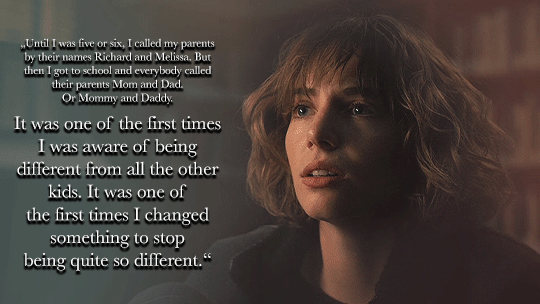
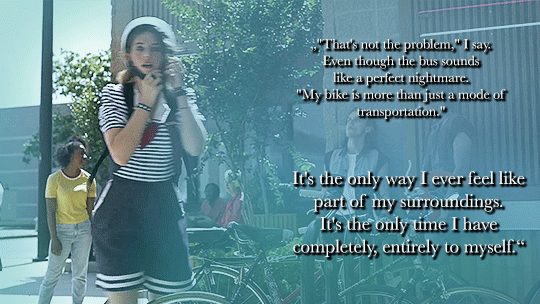
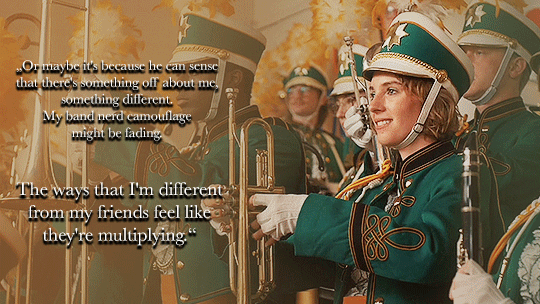
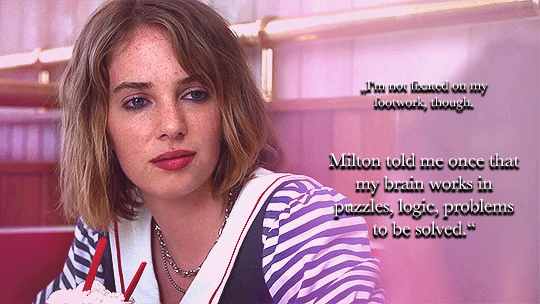
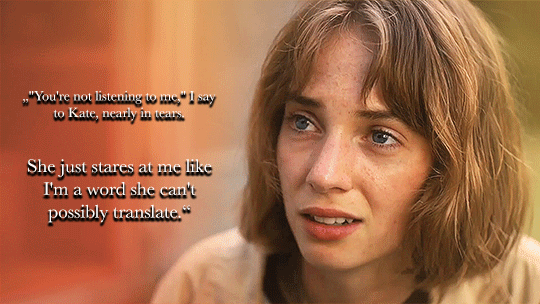
autistic robin (quotes from rebel robin by r. a. capetta)
#rebel robin#autistic robin buckley#robin buckley#autism#stranger things#robin buckley gifset#stranger things gifset#stranger things gifs#robin buckley gifs#yes some of this is also very applicable to the queer experience#but i just related so much to her autistic traits slash feelings slash thoughts in this book that i had to see it through an autistic lense#lesbian robin buckley#vanessas gifs#original post#a. r. capetta i thank you wholeheartedly for this book
327 notes
·
View notes
Note
I'm curious about your trans headcanons now. I see occasional fic with CP characters as trans men who are already fully transitioned by the time they get to college, but I would be really interested to see the dynamics of a character coming out as a woman. Especially a character who presents very masculine in the comic, like Jack.
Hiiiii, Ilove this ask, come here, let’s be friends.
I’m not muchof a headcanon person, by which I mean, when I have ideas about characters Itend to put them into stories instead of “what if” informal posts. Thiscomplicates my cool fannish image because I look very inactive when really I’vejust been writing tens of thousands of words that, like a dodo, I absolutelywill not post as WIPs. On the other hand, it does mean I’ve written 20,000words about Jack being trans. I’ve mentioned it here,but I’m not sure to what extent it’ll end up as a story that gets posted.
At theoutset I should say that I take a center-liberal approach to fic writing, whichis to say, I like things to be canon-compliant when they’re not straight-upAUs, but I’m not fundamentalist about what canon-compliant means. I think there’sroom to write a story that adheres to the comic canon but posits that the circumstancesof the characters’ lives and relationships might shift in the future, beyondwhere canon takes them. In that sense I think you have to look at who Jack isif you’re going to do this, and there isn’t a lot of overt evidence that he’ssuffering gender confusion.
There is,however, a lot of subtext. Jack’s story is, in a lot of ways, about strugglingto conform to a neat performance of masculinity. He works incredibly hard tomeet these social expectations; the kind of person Jack is supposed to be doesn’tdeal with mental illness, or drug dependency, or like boys. There is a lot oftextual evidence in the comic that he is consciously or subconsciously fightingagainst these things by controlling the aspects of his life that he can bringin line with expectations: how he spends his days, what his body looks like,and what he reveals about himself to other people. He’s vague and sometimesobfuscating about that, and puts his experiences in terms of what he doesrather than who he is, which I find to be an interesting kind of detachment. Hegoes around telling people he is dating Bitty, but in the comic so far hasn’t identifiedas gay or bi or even something more general like queer or not straight.
I liked thatmoment where he was talking about thecosts of playing hockey that he’s willing to endure, and he mentions, “The expectations and the spotlight …. The anxiety…” Obviouslyhe has expectations for himself, but by and large “the expectations and thespotlight” are things that are external to Jack, things happening to him; Ithink given the recurring theme of people speculating on and assessing him,fairly or unfairly, it seems like he is thinking of these expectations as thoseheld by other people, not ones he’s placing on himself. His anxiety is not anexternal thing, though; it’s something that’s real but is only ever happening inhis brain, that he’s doing to himself. It might be exacerbated by a toxicsports media culture and the general drag that is patriarchal heteronormative bullshit,but his brain is something for him to own, and he’s putting some distancebetween himself, and that.
It’s interestingto me that Jack comes out to George when they’re running. Some of this ispractical; Jack wants to talk to her in as private a place as he can, and heprobably doesn’t have a lot of opportunities to get her alone at work, and itmight have been too much build-up for him to reach out and say, “I need to getyou alone so I can talk to you.” At the same time you have to look at all thethings Jack is tacitly communicating to George: I’m dating a dude, but, I’m still an elite athleteconforming to all of the other expectations of masculinity, I’ll go on this runwith you, I’m down for whatever you put on me, I’m the same person I was the last time we went on a run. He even puts on a dude-ish baseball cap before he gets out of the car, like he’sputting on his dude drag to go have this conversation. God forbid hisconfession that he’s with Bitty undermine George’s view of him as one of herhockey players.
Even hischoice of Bitty as a romantic partner is something I don’t think the fandomexamines enough. Partly it’s because Check,Please! is a yaoi slash heart-eyes adoraboo webcomic, so a good portion ofthe audience is going to just accept this canon couple as a given withoutlooking into it too deeply. I remember Ngozi saying somewhere, at some point,that Jack needs someone really special to get through to him, with theimplication being that Bitty is that special person, he is a flawless angel childwho straddles both ends of the gender-presentation spectrum with his tinyperfect ass bisecting the middle, god bless him. But I’m cynical so I can’tjust take that as a given, and I have to think about the way in which thepeople we associate with, and especially, the people we are attracted to, areways in which we practice our own identity construction. How does standing nextto Bitty make Jack look? Maybe Jack doesn’t think about it in thatstraightforward a manner, but he must be aware on some level that this is goingto reflect back on him. Why does he send Bitty a zillion roses for Valentine’sDay? I mean, the comic isn’t there yet, but let’s think this out for a second: it’sa textbook male gesture to send the person you’re dating flowers. So, Jacksends Bitty shitloads of flowers. It’stoo easy to just say that Jack is super intense and he gives 110 percent, he’sso extra, etc. Like, yes, he is extra, but why is he so extra? Because he canbe? Or because Bitty will be 110 percent happier with 110 extra roses? Or because he’strying to perform 110 percent masculinity?
Writingabout Jack coming out as a woman and transitioning is an interesting way toneedle at his character. (And also, an interesting way to needle at myself, youknow, that’s writing for you.) Back to my center-liberal mode of fannish participation:I do not think that Jack is fundamentally being written this way, but rather,that it’s one way to interpret and examine how Jack relates to himself andparticipates in traditional masculinity. There are a zillion other ways to dothis, and I find that almost every OMGCP fic I write or post I make is essentiallygetting at the problem of Jack’s character from a different angle. (Except onefic that’s the same, except, Kent Parson instead.)
For me, a majorissue in the problem of Jack’s character is that trying to establish himself inthe echelons of professional hockey caused him to suffer greatly, to the pointof almost dying, possibly intentionally—but he decided, for some reason, thathe wanted to go back for more, and try again. So much of the work I see in thisfandom is about how Jack pushing himself to overcome his issues and succeed inhockey is a positive character trait, and readers are proud of him. But Ithink, within the canon and within the fandom, there is a major unansweredquestion in the form of, what the heck is going on with this character that hecannot and will not stop doing things that have the potential to cause himserious harm? Is he just autistic, and unable to detach from this thing he’sfixated on? Is it that he has literally never thought about anything else hemight do with his life? Or is it that he cannot stop thinking of himself as ahockey player? What would happen if he did? How would he start to think abouthimself, if he stopped thinking of himself as a hockey player and began to thinkof himself as anyone or anything else, and stopped compartmentalizing hisidentity and his experiences?
His brain ishorribly roadblocked. “I don’t think about this stuff too much,” he tellsShitty.And, sure, that’s normal, especially among men raised in hyper-masculinecontexts. But it’s normal because those men exist in a social context wherethey should be afraid of what they might find out about themselves if theythought about it too much. He then makes a joke about how he’s a robot andmakes fun of Shitty’s arguably less fraught romantic life, as if Shitty havingfeelings for Lardo is some kind of weakness. He then picks up Shitty and throwshim in a pile of leaves, which is so painfully overt and demonstrative adisplay of masculine and dominant behavior that Bitty notices from inside andyells at him. I don’t think this is what Ngozi intended, but it’s a fair enoughinterpretation of what’s going on: Shitty made Jack feel a little too much, ora little too conscious of himself, and so he has to respond by emasculatingShitty. Shitty’s like, “Love has changed you,” but like, I dunno, has it, or,how has it?
Granted, alot of this is nebulous, because we don’t know and probably won’t find out muchabout what happened to Jack when he was in juniors, what happened to Jack whenhe was in rehab, or what Jack’s decision-making process was when he applied tocollege—by which I mean, it’s unclear if he just saw it as a means to an end.It’s also unclear how Jack handles his anxiety—is he in therapy, is he takingmeds? It’s unclear how he thinks of himself in terms of drug use—for the mostpart, ending up in rehab at 18 is incongruous with having a beer every now andthen, though it’s also worth asking how having a beer at key moments makes himlook to other people, or how it makes him feel about himself. We just don’tknow that much about Jack, for all the comic is largely about him. It can bedifficult to pinpoint exactly how much he knows about himself, and why he’smade the choices he’s made, because many of those decisions are opaque toreaders.
But, that’swhere fandom gets to work. So I come back to the trans Jack thing here. Jackhas spent most of his life, probably, being told (perhaps implicitly more thanexplicitly) that he needed to do certain things and seem a certain way in orderto be taken seriously, and not be suspected of any kind of femmey or queerinclinations. (He knows that being with Kent Parson could have “really messedwith” their hockey careers, for one thing.) Am I saying that butch people, like, don’treally exist, and it’s all a construct? I don’t want to stick my nose into anature/nurture thing, but it’s undeniable that the style you project is part ofa complex network of influences, some of which are prejudices. To write Jack astrans is to ask questions about how those prejudices have affected him, andwhat might happen if he discarded them.
In terms ofhow a story about trans Jack would look, I can tell you what I’m interested inexamining: biology is destiny, and Jack’s body is pretty materially mannish. Towhat extent would it be possible to conform to that, reject it, subvert it?Jack’s attraction to Bitty is probably fixed, but Bitty is gay, and being withJack is an aspect of his constructionof self. How does Bitty cope with having someone else’s decisions destabilizehow he thinks and what he thinks he knows about himself? Jack is a publicfigure with a lot of privilege, but nor does Jack seem like an ideal or enthusiasticspokesperson or model for trans (or gay, or mental health) visibility. We don’tknow if Jack has any awareness of queer discourse or narratives, or how Jack wouldeasily fit into those, or not. How long does Jack think about this—is itsomething that occurs to Jack slowly, over many years, unsure how to act on it?Or is it something Jack realizes, suddenly, and wants to act on immediately? Howdoes this change how Jack relates to Jack’s parents? To the idea of being a parent? Would Jack want to playin the NHL as a woman? How does retirement and a life after hockey fit intoJack’s process?
Ultimately Idon’t think this fandom does that great a job at interrogating characters, orthe general situations they’re in. I’m kind of shocked at how little discussionthere is of what being a not-straight-guy paying hockey means. There’s a lot oftalk about how toxic masculinity is bad and learning to love yourself is good,but I don’t think the fandom is honest about just how physically andpsychologically damaging a hyper-aggressive sport can be, and why thesecharacters put themselves in harm’s way to endure it. It’s not just makingfriends and the thrill of winning and being Canadian; there are socially coded valuesinvolved. Bitty wrestling with his fear of checking to become marginally betterat hockey (if not at NHL-level) is, through one lens, a story about personaltriumph over adversity. But through another lens it’s a story about someoneputting themselves through hell and exposing themselves to harm over and over again,voluntarily—and for what? For camaraderie, for some scholarship dollars, forJack’s ass, sure—but that’s not all Bitty’s getting out of this.
So too withJack, is the thing, but times a zillion. And I wish the fandom did a better orat least more open job of addressing this. Writing a story where Jack is atrans woman is one means of doing so, or asking, why is he so freaking extra? What’she getting out of this? What does all that extra jocular dudeishness and hockeyfervor compensate for?
What’s itdistracting him from?
And whatwould happen if you took that away?
16 notes
·
View notes